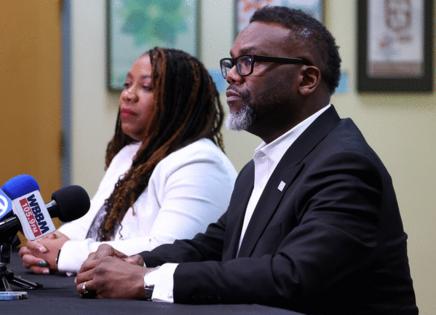Chicago Mayor Brandon Johnson launches budget working group, warns of financial 'crossroads' if Trump proceeds with cuts
Published in News & Features
CHICAGO — Saying Chicago’s already-precarious financial state is “at a crossroads” with President Donald Trump threatening to cut billions in funding to the city, Mayor Brandon Johnson on Monday took steps to try to get buy-in from residents and community leaders to make tough upcoming budget decisions.
Johnson signed an executive order directing his Office of Budget and Management to host public meetings and make a “comprehensive” review of all city spending. The order also launched a new working group of business and labor leaders, community groups, aldermen and mayoral staffers tasked with making far-reaching budget recommendations.
The mayor’s announcement comes after a bruising budget process last fall during which aldermen soundly rejected Johnson’s push for a property tax increase as the mayor swore off — and avoided — layoffs and service cuts.
By bringing a wide swath of city leaders into the jumpstarted budget process now, Johnson likely hopes to avoid carrying all the blame for potential unpopular solutions to the city’s fiscal woes he will need to consider if the budget situation in fact worsens for 2026 and beyond.
“We essentially need to do more with less,” Johnson told reporters.
City leaders have long known they will face a momentous challenge in balancing Chicago’s next spending plan. Last summer, Budget Director Annette Guzman forecast a 2026 budget gap of $1.12 billion, a number she said Monday was “mitigated” by the new taxes and fees City Hall imposed in December.
The challenge Chicago faces could grow by orders of magnitude with Trump threatening to cut $3 billion in federal funding to the city.
“That’s a different scenario that we weren’t under before,” Johnson said.
As he described the daunting, incoming budget gap, Johnson signaled a reluctant willingness to weigh major cuts. Asked if layoffs are on the table next year, Johnson said “they have been on the table for multiple budgets.” He described such a move as a “dramatic and severe” last resort in October.
“That’s not how we start the process. The process starts where we can find more productivity, where we can find operational strength,” Johnson said Monday. “We have to look at revenue as well.”
Johnson fought hard to avoid broad cuts last year. His staunch opposition to layoffs led him to propose a $300 million property tax hike, despite his own campaign promise to not raise property taxes. With his new working group, such a difficult decision could now come with the pre-packaged blessing of key city leaders.
The mayor announced an early start two weeks ago to budget discussions with aldermen, an apparent attempt to quell pushback from a City Council widely frustrated by the delayed, tangled budget process he led last year, and yet another signal of his effort to get ahead of the messy task.
In the small group beside Johnson Monday stood Ald. William Hall, tasked by the mayor over a year ago with heading a City Council Revenue Subcommittee.
Hall’s subcommittee met several times as Johnson repeatedly pointed to it as a source of soon-to-materialize solutions and proof that accusations of non-collaboration were false. However, the group failed to produce money-raising ideas that made it into the budget, though Hall again promised it would find usable revenue ideas in its second year.
Guzman said the city is contending with “stark fiscal realities.” If billions in federal grant funding for things like public health, education and housing were cut, the city would be “ill equipped” to replace it, she said.
“Overwhelmingly, the city of Chicago is not equipped to replace billions of dollars worth of grant funding from the federal government,” she said.
The fiscal challenge Chicago faces “was not the creation of any one administration,” said Ralph Martire, executive director of the Center for Tax and Budget Accountability, a nonpartisan fiscal policy think tank.
“You can’t resolve big structural problems that involve the revenue which feeds the city of Chicago, the services it provides, the capacity to provide those services unless you have everyone at the table,” said Martire, who plans to be a part of the working group.
“And unless you have everything on the table.”
____
©2025 Chicago Tribune. Visit at chicagotribune.com. Distributed by Tribune Content Agency, LLC.







Comments